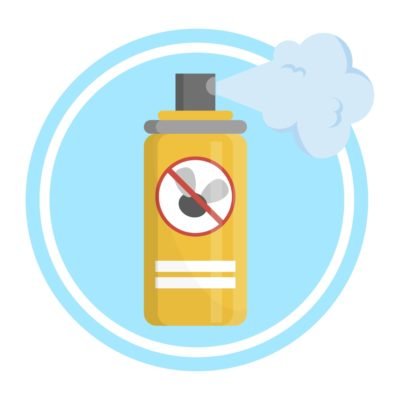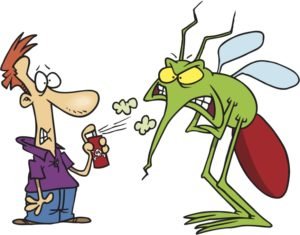One of the main mosquito-causing diseases that we worry about in the U.S. is West Nile Virus.
What’s West Nile Virus?
It’s a virus that causes brain inflammation (fancy name: encephalitis) and meningitis in kids and adults.
How is West Nile Virus Spread?
Through mosquito bites. Mosquitos get infected with the West Nile Virus when they feed on infected birds.
What are the Symptoms of a West Nile Virus Infection?
- A headache.
- A fever.
- Sensitivity to light.
Insider Info: People with West Nile virus look and act SICK.
The Good News:
- Only 20% of people with West Nile virus develop symptoms.1
- There are precautions you can take (such as using bug spray) to protect your child against West Nile virus.
The Not So Good News: West Nile Virus cannot be treated with antibiotics (because it’s a virus) and there aren’t any anti-viral medications to combat it. Therefore, hydration, rest, and fever reducers (such as Tylenol) are the mainstays of treatment.
What Can I Do to Protect My Child Against Mosquitos?

Here are the Top 4 Tips for Avoiding Mosquitos:

1. Mosquitos like to be out at dawn and dusk. Therefore, avoid long walks at these times and keep your child covered up.
2. Put insect netting on strollers.
3. Have your child wear long-sleeved shirts and pants when spending time in the woods or when walking outside at dawn or dusk.
4. Spray yourself and your kiddos with bug spray on a daily basis during the spring, summer, and early fall. If you have a backyard, have it sprayed for mosquitos. Learn more about the different bug sprays for kids below.
The Lowdown on Bug Spray

The two major types of bug spray used in children are DEET-containing bug sprays and Picaridin-containing bug sprays. DEET-containing bug sprays are thought to be the most effective and long-lasting of the two. Get Wise about these two types of bug spray below:
1. DEET-Containing Bug Sprays:
- DEET-containing bug sprays are the “gold standard” when it comes to insect repellents.
Note: DEET stands for N,N-Diethyl-meta-toluamide.
- Bug sprays that contain DEET repel mosquitos for 5+ hours (depending on the concentration of DEET used).
I’ve Heard Some Sketchy Things About DEET. Why Are People So Down On It?
Because it can be absorbed through the skin and cause “neurotoxic” effects (think: brain effects), such as dizziness. When applied safely, though, these effects are minimized.
Tips for Applying DEET Safely:
- The American Academy of Pediatrics (the AAP) recommends that kids use a bug spray with a low concentration of DEET (no more than 30%).
PediaTrivia: Repellents with 10% DEET are just as effective as repellents with 30% DEET, but they offer protection for about half of the time (2 hours vs. 5 hours).
- Refrain from using DEET-containing bug sprays in kids under 2 months old.
- Apply the bug spray once a day (only).
- Make sure that an adult is doing the spraying.
- Spray the repellant only on the exposed skin (no need to spray it under your child’s clothes).
Insider Info: Doctors typically recommend that parents wash off the DEET-containing bug spray when their child goes inside. Honestly, though, who’s going to remember to do that? Another option is to spray the bug spray on your child’s clothes and forget about putting it on the skin altogether.
- Avoid getting the bug spray on wounds or near your child’s eyes or mouth.
- Say no to products that combine a DEET-containing bug spray with sunscreen. Although these products sound like a dream come true, they’re problematic because sunscreen should be reapplied frequently throughout the day, whereas bug spray with DEET should NOT.
2. Picaridin-Containing Bug Spray:
- Picardin-containing bug sprays have been proven to be as effective as DEET-containing bug sprays, but they don’t last as long. However, they can be reapplied during the day.
- These bug sprays are safe for kids 2 months and older.
- Bonus: Picaridin-containing bug sprays do NOT need to be washed off. Hooray!
PediaWise Picks for Picaridin-Containing Bug Sprays:
General Tips for Applying Bug Spray to Kids:
- Avoid spraying insect repellent on your child’s hands. Why? Because kids are constantly putting their hands in their mouths.
- Skip the bug repellent candles, clip-ons, and bracelets. Why? Because they’re thought to be ineffective and, therefore, not worth buying. In addition, Citronella-based repellents require such frequent applications that they’re pretty much useless and Oil of Lemon Eucalyptus can’t be used in kids under 3 years.
The Bottom Line
While it’s unlikely that your child will ever get West Nile Virus, you can reduce his/her risk even further by following the tips above. When it comes to bug sprays, go for products that contain DEET or Picaridin.





